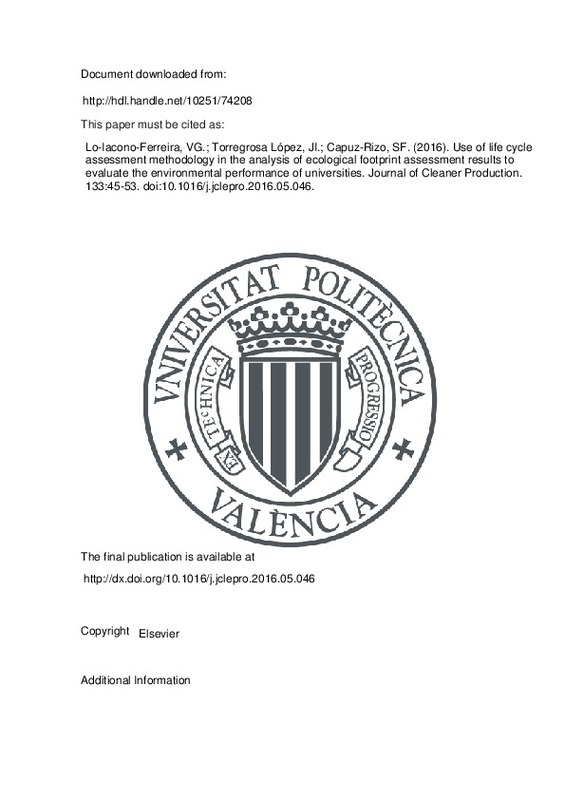JavaScript is disabled for your browser. Some features of this site may not work without it.
Buscar en RiuNet
Listar
Mi cuenta
Estadísticas
Ayuda RiuNet
Admin. UPV
Use of life cycle assessment methodology in the analysis of ecological footprint assessment results to evaluate the environmental performance of universities
Mostrar el registro sencillo del ítem
Ficheros en el ítem
| dc.contributor.author | Lo-Iacono-Ferreira, Vanesa G.
|
es_ES |
| dc.contributor.author | Torregrosa López, Juan Ignacio
|
es_ES |
| dc.contributor.author | Capuz-Rizo, Salvador F.
|
es_ES |
| dc.date.accessioned | 2016-11-16T13:19:36Z | |
| dc.date.available | 2016-11-16T13:19:36Z | |
| dc.date.issued | 2016-10-01 | |
| dc.identifier.issn | 0959-6526 | |
| dc.identifier.uri | http://hdl.handle.net/10251/74208 | |
| dc.description.abstract | The assessment of the environmental performance of an organization is an essential part of the decision making process of an Environmental Management System. Having robust indicators enables a reliable assessment. The Ecological Footprint Assessment is used in different types of organizations, including universities. Its ability to clearly communicate over-consumption by using a land-base unit is an advantage when involving the university community in achieving better environmental performance. However, its lack of standardization makes it difficult to use as an indicator. It is believed that Life Cycle Assessment offers a framework with which to standardize the Ecological Footprint Assessment. In this paper, an Ecological Footprint Assessment considering Life Cycle Assessment methodology is developed as a case study for Universitat Politecnica de Valencia. Findings regarding the critical decisions of the methodology are compared with 23 Ecological Footprint Assessments of universities using a Life Cycle Assessment framework. Only 26% of the studies analyzed reference the Life Cycle Assessment methodology. Critical decisions such as defining a Functional Unit were relevant but not standardized, while the definition of the product system was the most standardized and homogeneous decision. The difficulty of gathering information when Environmental Management Systems are not available makes the Ecological Footprint Assessment a weak indicator. Nevertheless, results show that Life Cycle Assessment can guide an Ecological Footprint Assessment methodology where comparability and reliability is possible. (C) 2016 Elsevier Ltd. All rights reserved. | es_ES |
| dc.language | Inglés | es_ES |
| dc.publisher | Elsevier | es_ES |
| dc.relation.ispartof | Journal of Cleaner Production | es_ES |
| dc.rights | Reserva de todos los derechos | es_ES |
| dc.subject | Life Cycle Assessment | es_ES |
| dc.subject | Ecological Footprint Assessment | es_ES |
| dc.subject | Universities | es_ES |
| dc.subject | Scope | es_ES |
| dc.subject | Functional Unit | es_ES |
| dc.subject | System Boundaries | es_ES |
| dc.subject.classification | PROYECTOS DE INGENIERIA | es_ES |
| dc.subject.classification | INGENIERIA QUIMICA | es_ES |
| dc.title | Use of life cycle assessment methodology in the analysis of ecological footprint assessment results to evaluate the environmental performance of universities | es_ES |
| dc.type | Artículo | es_ES |
| dc.identifier.doi | 10.1016/j.jclepro.2016.05.046 | |
| dc.rights.accessRights | Abierto | es_ES |
| dc.contributor.affiliation | Universitat Politècnica de València. Escuela Técnica Superior de Ingenieros Industriales - Escola Tècnica Superior d'Enginyers Industrials | es_ES |
| dc.contributor.affiliation | Universitat Politècnica de València. Escuela Politécnica Superior de Alcoy - Escola Politècnica Superior d'Alcoi | es_ES |
| dc.description.bibliographicCitation | Lo-Iacono-Ferreira, VG.; Torregrosa López, JI.; Capuz-Rizo, SF. (2016). Use of life cycle assessment methodology in the analysis of ecological footprint assessment results to evaluate the environmental performance of universities. Journal of Cleaner Production. 133:45-53. doi:10.1016/j.jclepro.2016.05.046 | es_ES |
| dc.description.accrualMethod | S | es_ES |
| dc.relation.publisherversion | http://dx.doi.org/10.1016/j.jclepro.2016.05.046 | es_ES |
| dc.description.upvformatpinicio | 45 | es_ES |
| dc.description.upvformatpfin | 53 | es_ES |
| dc.type.version | info:eu-repo/semantics/publishedVersion | es_ES |
| dc.description.volume | 133 | es_ES |
| dc.relation.senia | 315470 | es_ES |
| dc.identifier.eissn | 1879-1786 |







![[Cerrado]](/themes/UPV/images/candado.png)

